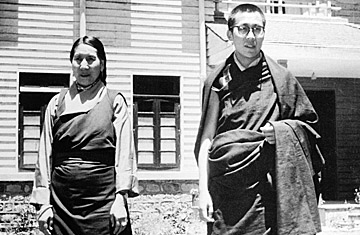
May 28, 1959: Tenzin Gyatso, the 14th Dalai Lama, and his mother, shortly after the Tibetan Buddhist ruler fled his homeland for exile in northern India
(5 of 9)
Tibet is cold, filled with silence and bones, haunted by demons; yet Tibetans are a strangely happy people. In the brief two months of summer, they swarm from their dirty, smoke-filled houses, set up white tents with blue trimmings on the river meadows, sing, drink milk beer and tell stories. They splash together in the streams for their first baths of the year. Nearly every visitor to penetrate the forbidden land has been enchanted by its people. They do few things terribly well, but everything with zest. Explorer Fosco Maraini believes they have found the secret of liberty, which is "to live like a flower or a stone; sheltering from the rain in bad weather, enjoying the sun if it is fine, breathing in the fullness of the afternoon, the sweetness of evening, the mysteriousness of night, with equal joy and wisdom. Perhaps that is why you hear singing everywhere, fine music that fades away into space as if it were spontaneously generated." Coming back to the outside world from Tibet, travelers miss the serenity and peace, the brimful feeling of being at one with nature and the universe, the unfailing courtesy of Tibetans, and their pious avoidance of cruelty to any living thing.
Defender of the Faith. For the four-year-old Dalai Lama, arrival in Tibet meant an end to childhood. He was enthroned at Lhasa in 1940 and endowed with many names—the Tender, Glorious One, the Holy One, the Mighty of Speech, the Excellent Understanding, the Absolute Wisdom, the Defender of the Faith. He sat through the hours-long ceremonies without complaint, a slim, grave-eyed boy with protuberant ears.
The Dalai Lama's peasant family came with him to Lhasa, and his father was made a noble, but he saw little of them. His days were spent with monkish tutors, in learning the Tantric texts of Lamaism and the complex religious ceremonials. At night he went to sleep in the enormous, fortresslike Potala, and could hear the palace gates close harshly and the ringing shouts of the watchmen as they marched through the long, twisting corridors. Without playmates or attending parents, the Dalai Lama matured early, and at 14 he visited Lhasa's great monasteries of Drepung and Sera to engage in religious disputation with their learned abbots. This was a critical moment, for upon his intelligence and agility of mind would depend the future balance of power. He would not be deposed should he fail the examination, but he could be turned into a puppet—a Living Buddha who was easily manipulated by shrewd and able monks.
At Drepung monastery thousands of red-robed lamas crouched on their haunches in a graveled courtyard while the 14-year-old Dalai Lama preached to them on the Tantric texts in a clear, boyish voice, but with the composure and assurance of an adult. A Tibetan-speaking Westerner was there, an Austrian named Heinrich Harrer, who had escaped from a prisoner-of-war camp in India and painfully made his way to asylum in Lhasa. The debate that followed between the abbot and the Dalai Lama was a genuine contest of wits, says Harrer, in which the God-King was "never for a moment disconcerted," while the venerable abbot "was hard put to hold his own."
